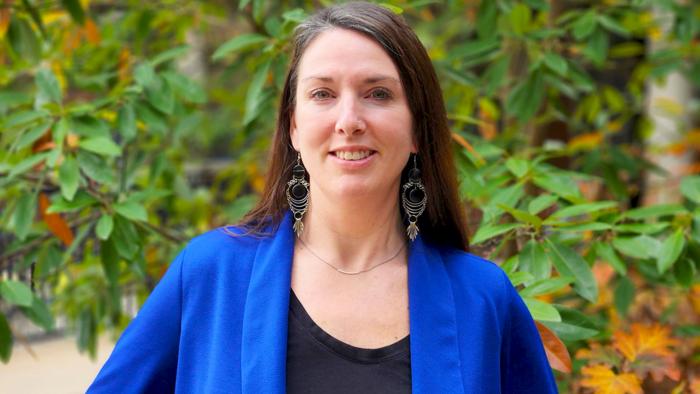The United States has one of the highest incarceration rates in the world. And that’s not the only challenge — nearly 44% of U.S. citizens who are released from prison end up returning in less than a year. While many shy away from the statistics, University of Missouri researcher Kelli Canada has taken note and devoted her career as a social worker to improving the mental health and well-being of those in the criminal justice system.

Credit: University of Missouri
The United States has one of the highest incarceration rates in the world. And that’s not the only challenge — nearly 44% of U.S. citizens who are released from prison end up returning in less than a year. While many shy away from the statistics, University of Missouri researcher Kelli Canada has taken note and devoted her career as a social worker to improving the mental health and well-being of those in the criminal justice system.
“When you look at the data, specifically regarding prison re-entry, it’s clear to see something isn’t working,” Canada said. “I’m passionate about improving the conditions for those who live and work inside prisons, and my ultimate goal is to help incarcerated individuals re-enter society with the skills and resources they need to be successful long-term.”
A multi-pronged mission
Canada and her research team recently received a $2.8 million grant from Arnold Ventures to help transform the ways people live and work in four Missouri prisons. The five-year project has four key components: staff training, changes to physical spaces within prisons, personal skill building for residents, and community connections.
- Staff training
Prison staffers will be trained on the importance of empathetic listening and using more humanizing language, such as calling residents by their names rather than referring to them by a specific number that was associated with them upon imprisonment.“We also want to promote referring to incarcerated individuals as ‘residents’ rather than ‘offenders’ or ‘inmates,'” Canada said. “These might seem like small changes, but they can have a big impact on how people feel about themselves, ultimately improving their mental health.”
- Physical transformations
The physical environment of prisons will be altered to provide increased privacy for residents. Other changes include painting the walls of the prison, adding additional lighting, creating communal spaces with games and coloring books for residents to spend time with their kids and families, and increasing access to outdoor spaces.One of Canada’s biggest priorities is restructuring prisons to increase privacy for residents who often have to use the restroom in front of their cell roomates.
“Residents often have to go to the bathroom in front of their roommates,” Canada said. “Giving them space to use the bathroom in private and have some quiet time to themselves is a healthy practice that can help people de-stress, especially when they are going through a tough period in their life. We will also be creating more comfortable communal spaces for residents to read newspapers or magazines together outside of their cells, and we are excited to be constructing communal kitchens so residents can prepare a meal together in a ‘normal’ kitchen environment.”
- Personal skills
Residents will learn skills like budgeting money and cooking meals when their family or friends come to visit.“These might seem like basic skills, but one thing we’ve learned over the years is some residents, especially younger residents, have never had to the opportunity to learn these skills before,” Canada said. “Not only can it do a lot to improve their self-confidence if they can cook a meal to share with their family or friends who come to visit, but these are skills they can take with them back into society when they exit prison.”
- Community connections
Finally, the project aims to help residents feel like a connected community by assigning various tasks for keeping common areas clean. Some examples include rotating schedules for sweeping and mopping floors, cleaning the communal kitchens and making sure old food in the refrigerators is thrown away.“By holding each other accountable, we can teach the importance of treating others with respect and thinking about how one’s own actions can impact the broader community,” Canada said. “We also want to give the residents more resources so they are successful upon re-entry to society, so we will be setting up job interviews via Zoom and improving work-release programs to better facilitate job trainings after release from prison.”
Finding common ground
Canada’s latest work builds off her recent Prison Research and Innovation Network (PRIN) project, which used a community-engaged research model to bring together staff members and prison residents at the Moberly Correctional Center to discuss ways to improve conditions in the prison.
“It has been incredible to see what changes can happen when you allow prison staff and residents to brainstorm collaborative ideas and build innovations together,” Canada said. “We can’t change things for one group and not the other, and I am proud to support MU’s land-grant mission by conducting research that improves lives out in the broader community.”
Editor’s note
Canada’s collaborators on the project include MU’s Ashley Givens, Francis Huang and Rabia Faizan, as well as Beth Huebner from Arizona State University and Janet Garcia-Hallett from University of New Haven.




